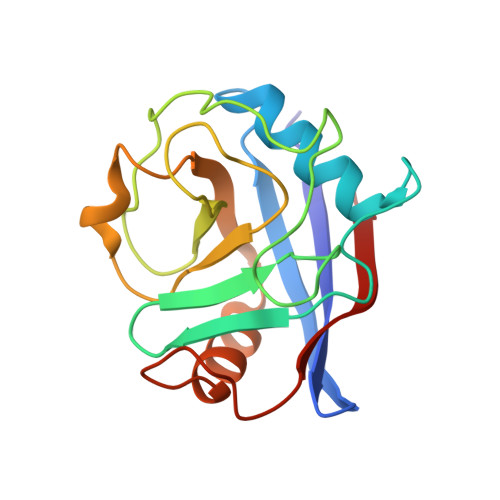Fragment-based discovery of a new family of non-peptidic small-molecule cyclophilin inhibitors with potent antiviral activities.
Ahmed-Belkacem, A., Colliandre, L., Ahnou, N., Nevers, Q., Gelin, M., Bessin, Y., Brillet, R., Cala, O., Douguet, D., Bourguet, W., Krimm, I., Pawlotsky, J.M., Guichou, J.F.(2016) Nat Commun 7: 12777-12777
- PubMed: 27652979
- DOI: https://doi.org/10.1038/ncomms12777
- Primary Citation of Related Structures:
3R49, 3R4G, 3R54, 3R56, 3R57, 3R59, 3RCF, 3RCG, 3RCI, 3RCK, 3RCL, 3RD9, 3RDA, 3RDB, 3RDD, 4J58, 4J59, 4J5B, 4J5C, 4J5D, 4J5E - PubMed Abstract:
Cyclophilins are peptidyl-prolyl cis/trans isomerases (PPIase) that catalyse the interconversion of the peptide bond at proline residues. Several cyclophilins play a pivotal role in the life cycle of a number of viruses. The existing cyclophilin inhibitors, all derived from cyclosporine A or sanglifehrin A, have disadvantages, including their size, potential for side effects unrelated to cyclophilin inhibition and drug-drug interactions, unclear antiviral spectrum and manufacturing issues. Here we use a fragment-based drug discovery approach using nucleic magnetic resonance, X-ray crystallography and structure-based compound optimization to generate a new family of non-peptidic, small-molecule cyclophilin inhibitors with potent in vitro PPIase inhibitory activity and antiviral activity against hepatitis C virus, human immunodeficiency virus and coronaviruses. This family of compounds has the potential for broad-spectrum, high-barrier-to-resistance treatment of viral infections.
- INSERM U955 'Pathophysiology and Therapy of Chronic Viral Hepatitis and Related Cancers', Hôpital Henri Mondor, Université Paris-Est, 51 avenue du Maréchal de Lattre de Tassigny, 94010 Créteil, France.
Organizational Affiliation:

















